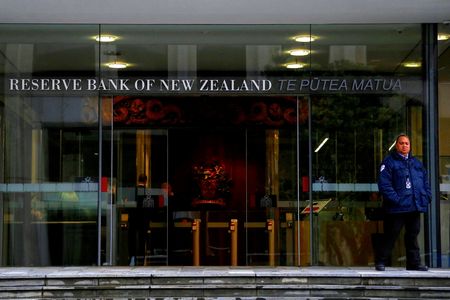
By Lucy Craymer
WELLINGTON (Reuters) -New Zealand’s central bank on Wednesday raised interest rates by 25 basis points to the highest in more than 14 years to 5.5% and reiterated inflation remains too high even as it still forecast a recession this year.
The decision was in line with expectations from 21 of 25 economists in a Reuters poll forecasting the Reserve Bank of New Zealand (RBNZ) would raise rates by 25 basis points in its twelfth straight hike since October 2021.
“The OCR (official cash rate) will need to remain at a restrictive level for the foreseeable future, to ensure that consumer price inflation returns to the 1% to 3% annual target range, while supporting maximum sustainable employment,” the statement said.
The RBNZ continues to expect the official cash rate to peak at its current level of 5.5% and remain there until the middle of the year, according to the monetary policy statement (MPS) accompanying the rate decision.
A front-runner in withdrawing pandemic-era stimulus among its peers, the RBNZ has remained singularly focused on curbing inflation, lifting rates by 525 basis points since October 2021. This has been its most aggressive policy tightening streak since the official cash rate was introduced in 1999.
“The Monetary Policy Committee reached a consensus that interest rates will need to remain at a restrictive level for the foreseeable future, to ensure consumer price inflation returns to the 1 to 3% target range while supporting maximum sustainable employment,” the RBNZ minutes said.
New Zealand’s annual inflation has come off in recent months and is currently running just below a three-decade high of 6.7%, with expectations it will return to the central bank’s 1% to 3% target within two years.
The New Zealand dollar slumped 1% to a three-week low of $0.6185 after the rate decision, while benchmark two-year interest rate swaps dropped to 5.2350%, pulling away from a 14-year high of 5.5750% earlier in the day.
The minutes said the committee had looked at the possibility of leaving the cash rate unchanged and the committee’s decision to increase the cash rate was supported by just five of the committee’s seven members.
The central bank is still forecasting a technical recession and is projecting negative growth in both the second and third quarters of 2023.
(Reporting by Lucy Craymer; Editing by Tom Hogue and Sonali Paul)
